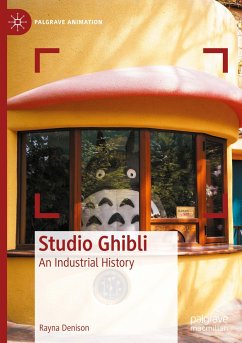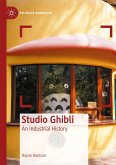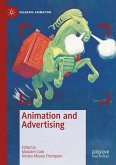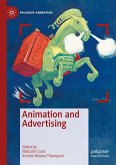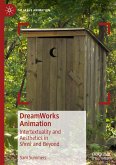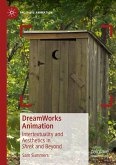Studio Ghibli: An Industrial History takes us deep into the production world of the animation studio co-founded by Oscar-winning director Hayao Miyazaki. It investigates the production culture at Studio Ghibli and considers how the studio has become one of the world's most famous animation houses. The book breaks with the usual methods for studying Miyazaki and Ghibli's films, going beyond textual analysis to unpack the myths that have grown up around the studio during its long history. It looks back at over 35 years of filmmaking by Miyazaki and other Ghibli directors, reconsidering the studio's reputation for egalitarianism and feminism, re-examining its relationship to the art of cel and CG animation, investigating Studio Ghibli's work outside of feature filmmaking from advertising to videogames and tackling the studio's difficulties in finding new generations of directors to follow in the footsteps of Miyazaki and Isao Takahata. By reconstructing the history of Studio Ghibli through its own records, promotional documents and staff interviews, Studio Ghibli: An Industrial History offers a new perspective not just on Ghibli, but on the industrial history of Japanese animation.
"As Rayna Denison's new book, Studio Ghibli: An Industrial History, outlines, there are all sorts of assumptions made by commentators on Studio Ghibli's work, including the one that Hayao Miyazaki is the be-all and end-all of its output. ... while Ghibli might be the obvious starting point for publishers, authors and readers, Denison's book will set a standard for many years to come." (Jonathan Clements, All the Anime, blog.alltheanime.com, February 26, 2023)
"... Sind die Erkenntnisse über Studio Ghibli an sich zwar äußerst aufschlussreich, so ist es vielmehr die darüber hinausgehende Art, wie die Autorin ihre in der Einleitung beschriebene Methodologie umsetzt, welche Denisons Monografie lesenswert werden lässt. Sie legt somit einen möglichen Grundstein für fortführende Forschung und für das Schreiben von Industriegeschichten zu weiteren (japanischen) Animationsstudios ..." (David Höwelkröger, in: MEDIENwissenschaft, Heft 3, 2023)
"... Sind die Erkenntnisse über Studio Ghibli an sich zwar äußerst aufschlussreich, so ist es vielmehr die darüber hinausgehende Art, wie die Autorin ihre in der Einleitung beschriebene Methodologie umsetzt, welche Denisons Monografie lesenswert werden lässt. Sie legt somit einen möglichen Grundstein für fortführende Forschung und für das Schreiben von Industriegeschichten zu weiteren (japanischen) Animationsstudios ..." (David Höwelkröger, in: MEDIENwissenschaft, Heft 3, 2023)

